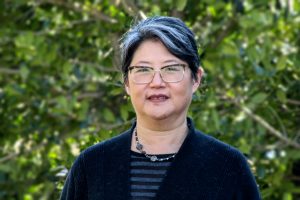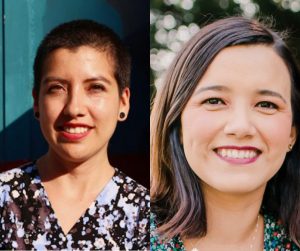Teaching in the Time of COVID: Keepers and Takeaways
May 7, 2021
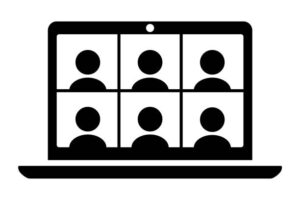
In the last workshop of our fully virtual 2020-2021 programming, HTLab director Lindsay DiCuirci led a discussion reviewing experiences from a full year of teaching online and its implications for radical and permanent changes in pedagogy. With presentations by Professors Marina del Sol (Howard University), Sharon Tran (UMBC), and Lee Boot (UMBC), participants reflected on the “keepers” and takeaways from teaching remotely, and shared resources in this collaborative document.
_______________________________________________________________________________________________
Accessible Teaching: Collective and Participatory Approaches
April 9, 2021
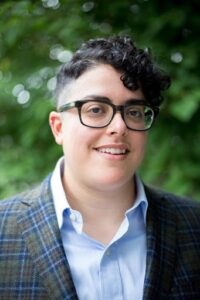 Dr. Aimi Hamraie discussed how to build accessible and justice-centered pedagogy and curriculum, with a focus on collective and participatory approaches to learning. Going beyond models of individual accommodation, the workshop drew on frameworks from critical, feminist, and disability pedagogies, as well as examples of project-based classroom and campus learning experiences, including accessibility mapping, podcasting, and parties as scholarly, pedagogical, and administrative praxis. Dr. Hamraie’s presentation can be viewed here.
Dr. Aimi Hamraie discussed how to build accessible and justice-centered pedagogy and curriculum, with a focus on collective and participatory approaches to learning. Going beyond models of individual accommodation, the workshop drew on frameworks from critical, feminist, and disability pedagogies, as well as examples of project-based classroom and campus learning experiences, including accessibility mapping, podcasting, and parties as scholarly, pedagogical, and administrative praxis. Dr. Hamraie’s presentation can be viewed here.
_______________________________________________________________________________________________
Teaching Your Wildest Dreams: Constructing Courses That Advance Social Justice
March 5, 2021
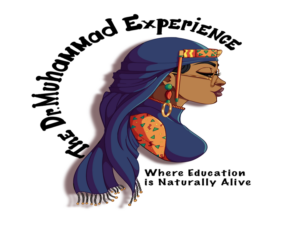
Dr. Bahiyyah Muhammad, Assistant Professor of Howard University Sociology and Criminology, whose pedagogical approach has been dubbed The Dr. Muhammad Experience, led an HTLab discussing how to transform classrooms into experiential learning laboratories in real time and space. The workshop featured examples from Dr. Muhammad’s award-winning global curriculum, from her Policing Inside Out, MOM Camp for Children of Incarcerated Parents and her Higher Education in Prison Remix. Resources from this lab can be found here.
_______________________________________________________________________________________________
In Harmony: Building and Sustaining Community Partnerships
February 5, 2021
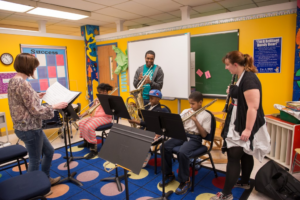 How do we ensure that community partnerships are beneficial and equitable for all parties? In this HTLab, Professor Brian Kaufman of the UMBC Department of Music shared best practices for collaborating with community partners in the arts (and beyond) as well as tips for adjusting to virtual settings. Kaufman also shared his own experience developing a partnership with the Baltimore Symphony Orchesta’s OrchKids program over the last 7 years. He led participants in a guided tutorial of the collaborative project and organization app Padlet, and explained how he uses this tool when working with students and partners.
How do we ensure that community partnerships are beneficial and equitable for all parties? In this HTLab, Professor Brian Kaufman of the UMBC Department of Music shared best practices for collaborating with community partners in the arts (and beyond) as well as tips for adjusting to virtual settings. Kaufman also shared his own experience developing a partnership with the Baltimore Symphony Orchesta’s OrchKids program over the last 7 years. He led participants in a guided tutorial of the collaborative project and organization app Padlet, and explained how he uses this tool when working with students and partners.
_______________________________________________________________________________________________
Writing with Our Bodies: Diversity, Embodiment, and Technology in the Humanities Classroom
November 20, 2020
Dr. Christina V. Cedillo, Assistant Professor of Writing and Rhetoric at the University of Houston Clear Lake, led a workshop discussing relationships between bodies and multimodal composition. She presented research and reflective questions on how a focus on bodies informs new, culturally-informed approaches to composition in the humanities classroom. Participants were challenged to think about how their pedagogical practices, including the media and technology they use in class, accounts for students’ embodied experiences. For further reading on Dr. Cedillo’s work, see “What Does it Mean to Move? Race, Disability, and Critical Embodiment Pedagogy” which includes suggested assignments for embodied composing, and “Honoring Students’ Multimodal Home Places,” which includes templates for students to map their own home places.
_______________________________________________________________________________________________
Mapping the Lived Environment
Dr. Jean Lee Cole, Professor of English at Loyola University, Maryland, led a workshop focused on what trees can teach us about the intersections of literature, the environment, and equity. Dr. Cole introduced participants to digital tools like iTree to calculate economic/environmental benefits of trees in their immediate lived environment; StoryMapJS to explore the role played by trees in real life, literature, and history; and izi.TRAVEL to create audio tours. Participants learned how to frame assignments around forging personal connections to tree species and understanding the roles played by trees in ecological, symbolic, and social systems. For assignment prompts and syllabi related to these projects, visit the HT Lab Guides and Templates page.
_______________________________________________________________________________________________
Telling Intercultural Tales: Digital Storytelling for Building Community
September 25, 2020
Dr. Tania Lizarazo and Dr. Thania Muñoz D. of the Department of Modern Languages, Linguistics and Intercultural Communication led a workshop on their digital storytelling project Intercultural Tales, guiding participants on how to use digital stories as part of community-building and reflective writing exercises in the context of online learning. They explored three fundamental stages of digital storytelling: the story circle, the storyboard, and the production, using Adobe Express to create previews of a final story. Resources from the lab, including a storyboard template, can be found here.

